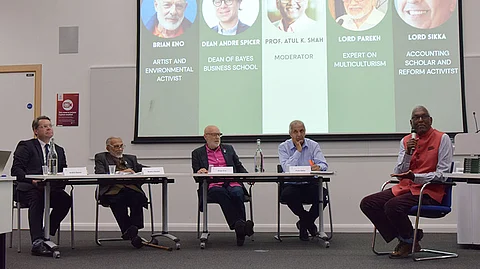

Professor Atul K. Shah of City St Georges, University of London, this week launched a pioneering new work entitled ‘Organic Finance’, aimed at reshaping the science of finance by making it caring, fair, accountable and responsible.
Like “organic food”, which is not adulterated by chemicals or farmed in a factory, ‘Organic Finance’ provides a very different way of understanding the nature and limits of money, and ensuring that it stays healthy and nutritious without any harmful chemicals or side effects.
Writer Martin Palmer said: “Professor Shah has produced a once-in-a-lifetime book. He takes us on one of the most extraordinary explorations of the intellectual, cultural and significant insights to be found throughout the cultures of the world which fundamentally challenge just about everything conventional economics teaches.”
The book was launched at the university on June 24 in the presence of a diverse audience of business leaders, community pioneers, professionals and students. A panel discussion to mark the event brought together Lord Bhikhu Parekh, world expert on multi-culturalism, Brian Eno, one of the world’s most famous artists and musicians, Lord Prem Sikka, a pioneering scholar of ethical accounting and finance, and Professor Andre Spicer, the Dean of Bayes Business School.
In his address, Professor Spicer emphasised the critical importance of culture and diversity in finance, and the need to teach students responsible business which encourages sustainable leadership and practice. He highlighted how the book helps in showcasing the vast cultural and religious diversity of finance, and the powerful message of the Dharmic faiths in helping the world cope with its environmental crisis. This multi-cultural approach is of its time, he said.
MORE LIKE THIS…
Lord Sikka explained the rising inequality and corruption of society by the super-rich, who use their power and influence to pay minimum taxes, and extract lowest wages from workers to maximise their own profits. The side-effects of such practices in terms of breakdowns in health, housing and employment create significant ruptures, breaking whole families and communities.
Lord Parekh explained how culture is a canvas on which knowledge is experienced and implemented, and to ignore its importance, is to misunderstand how people learn and develop their business and enterprise.
Eno highlighted how most of the interesting work in modern society is happening at the margins, not the mainstream. In fields as diverse as art, music, spirituality, philosophy and even social science, it is the people at the margins who are the innovators, who care deeply about society and an ethical future, yet are rarely listened to. He was extremely critical of rich elites who do not pay their fair taxes, and capture political and regulatory processes to enhance their personal fortunes.
Bunty Shah, a social entrepreneur who attended the event found it very stimulating and thought provoking, and wants this research to spread far and wide, to inspire the next generation of economists, bankers, entrepreneurs and accountants.
MORE LIKE THIS…
“Young people today want to make a difference and move away from greed towards shared success, and a sustainable future, where animals and the environment are nourished and protected, not exploited and destroyed,” he said.
‘Organic Finance’ is a 200-page research monograph published by Routledge, drawing upon over 30 years of Professor Shah’s research in ethical accounting and finance.
*Info: Organic Finance